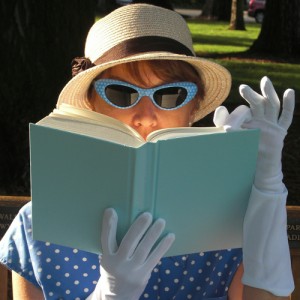Why do writers write? What keeps us writing when the writing gets tough? For my own answer, let’s peek behind the writer’s curtain to the summer of ’95, to a writer’s conference held at a local college some five miles from my home. The cost was low, the caliber of guest authors was high, and I didn’t need to spring for air fare or a hotel room. Perfect.
He droops in the heat on his way to the English building: gray whiskers, black sleeves over pale arms, leather sandals. Any serious writer knows this man; we’ve heard his book reviews on NPR, read his tight writing, swallowed hard as he ripped through a student’s submission. At this writer’s conference there are other fiction manuscript workshops led by kinder, gentler authors, but I follow him, a man who is renowned not only for his writing, but for being the bad cop.
From the front of the class he scrutinizes the room and we hunch forward as he discusses craft. “But enough about Nick Hornby,” he says with a clenched smile, “let’s talk about my work.” Meant as a joke, but the truest thing he’s said.
When it’s my turn to read aloud, my voice trembles, my heart thuds. Halfway through the first page, he interrupts. “Too much nattering,” he says. Nattering? What does he mean, nattering? I ask another teacher after the workshop, who shrugs. “He probably means too much narrative.”
Later, I’ll know: too much of nothing happening. No conflict. No drive. Too much nattering.
At the dinner break I drive home and print out a short story from my archives—a story, I believe, free of nattering. I drive back to campus and linger in the courtyard, waiting. When he arrives, chatting with a fellow teacher, I make a beeline. “Would you mind?” I ask. “Would you take a moment to look over my work, see if I’m nattering?”
He doesn’t say hello or ask my name. Behind wire-rimmed glasses his eyes rest on the page. He points to the first sentence. “I would have described the color,” he says, and his bent finger moves to the next. “Don’t tell me there’s no truck. I know that.” Next sentence. “This happened in the indeterminate past. You’ve pulled me from the present. Keep it positive.” For two paragraphs he shreds every word I’ve cherished, and then looks up and grins. “You’re taking the punches well,” he says. I try to pull his focus back to the page but it’s no use; the tears well up, and he notices. “Are you crying?” he asks, and I nod, covering my mouth. “Why?” His voice is bewildered, soft. “Is it something I said?”
“I just want to get it,” I say. “I try so hard. I just want to get it.”
“What do you read?” he asks. My mind goes blank. I’m an avid reader, but can’t recall a single title. “You need to read like a writer.” And I understand: writers are driven to read, not just for the pleasure, but to flower, to grow, to quench a thirst.
We want to get it.
So I read. Short stories. Poetry. Essays. Books about writing.
I want to get it.
I read literary stories for language and character; mysteries to analyze plot. I pick up a bestseller at the library.
Popcorn, my inner critic says.
“But people buy her work. A lot of people. She must be doing something right.”
Bubblegum.
I’m hooked by page two. Why?
I want to get it.
For a hefty fee, I enroll in an advanced fiction-writing workshop. We dissect each piece to uncover the beating heart, and I feel slightly sick afterwards. I write, draft after draft, as compelled as Sisyphus.
I take the NaNoWriMo challenge and write a 50,000-word novella during the month of November—four years in a row. I learn to get out of my own way and pound out a rough first draft and emerge on the 30th, drained but high on the act of creating sinew and flesh from dialogue and narrative, the story unraveling as if I were reading it…a zillion times better than reading. Each year my voice gets stronger and my back gets weaker.
In January, I unearth one of the skeletons from its storage box and read it.
Not good.
Not bad, either.
Needs a rewrite.
Many, many.
How do I rewrite?
More reading. Books on plot and structure and making fiction zing. More analyzing. More writing. And rewriting. Until I’ve written the life right out of it. Then it’s back to the lonely keyboard, pounding out even more words.
I.
Want.
To.
Get.
It.
But I’m ahead of myself.
At the conference, after the tears, I rewrite my short story through the night, focusing on sensory details. In the morning, armed with ten copies, I stride past the bad cop (who’s really a good cop in disguise) standing outside the door to his workshop. “I’m back for round two,” I say, and he winces.
When my turn comes, I read the first page aloud, then look up.
He settles back in his chair.
And smiles.
“What a difference a day makes,” he says.
Takeaways this week:
Read. The good, the bad, and the so-so. Read to learn how other authors handle whatever elements of craft you struggle with in your own writing. Dialogue? Backstory? Character development? Plot? Whatever. Read.
Write. The good, the bad, and the so-so. Keep your writing muscle strong. Like a trombonist who loses his lip if he doesn’t practice, we writers lose our chops when we get lazy. Five minutes a day, if that’s all the space you’ve got, but do it.
Learn. From writing instructors, other writers, books on writing. Learn about story from country music. Learn about rhythm from jazz. Learn about form from dance, perspective from paintings, viewpoint from films. Learn about dialogue from listening, subtext from observation. Keep learning.
Never give up. If writing is in your soul, don’t let anything stop you from creating. Not your inner critic, not your outer critics. No matter how many times you get knocked sideways, no matter how many rounds it takes, get back on your wobbly feet and keep plugging away.


My Dad, a writer and English Professor used to say “It’s no fun if can’t make them cry!” I think(hope) this was in jest. I am visual artist and have cried in the parking lot after critique. Having said that I too go back round two or three; because getting to the next level requires the pain.
So true! The important thing is not to let the critique destroy your belief in your abilities. Take it in like a sponge, and wring out whatever doesn’t feel right.
This is why you’re a writer. The wanting. And not giving up. Go you!
Yeah! Yee haw! I’m a writer, dagnammit! Woo-hoo! (Thanks)
I once had a writer on a writing forum pull apart my work for always using ‘was’ and ‘had’. I was upset at the time but I figured I’d prove him wrong, and change all of the uses of ‘was’ and ‘had’ to other words. I thought it would weaken what I’d written.
It didn’t. Now I make a point of paying attention to what people say!
That was a great lesson. Er, I mean…Great lesson!
Thanks for the pep talk!
Anytime. Thanks for the comment!
I think you are a great writer!!! You always keep me engaged and looking forward to the next piece! I think you are way too critical of yourself. Don’t take the fun out of it.
Words of wisdom from my cheering section. Thanks!
Diane, this is completely fabulous! You were brave going back for round two! Love your takeaways.
Thanks, Pearl!